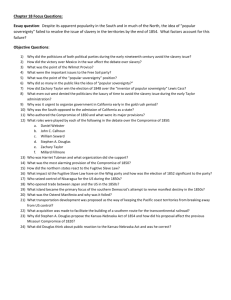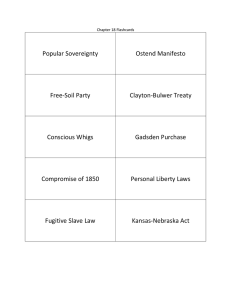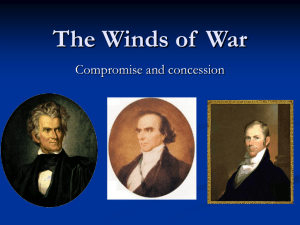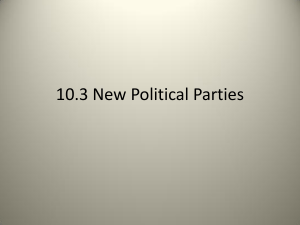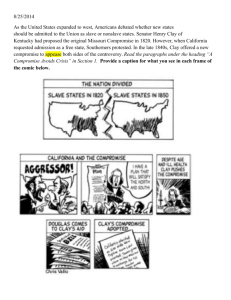Western Expansion/Sectionalism Vocabulary Test Americans of the
advertisement
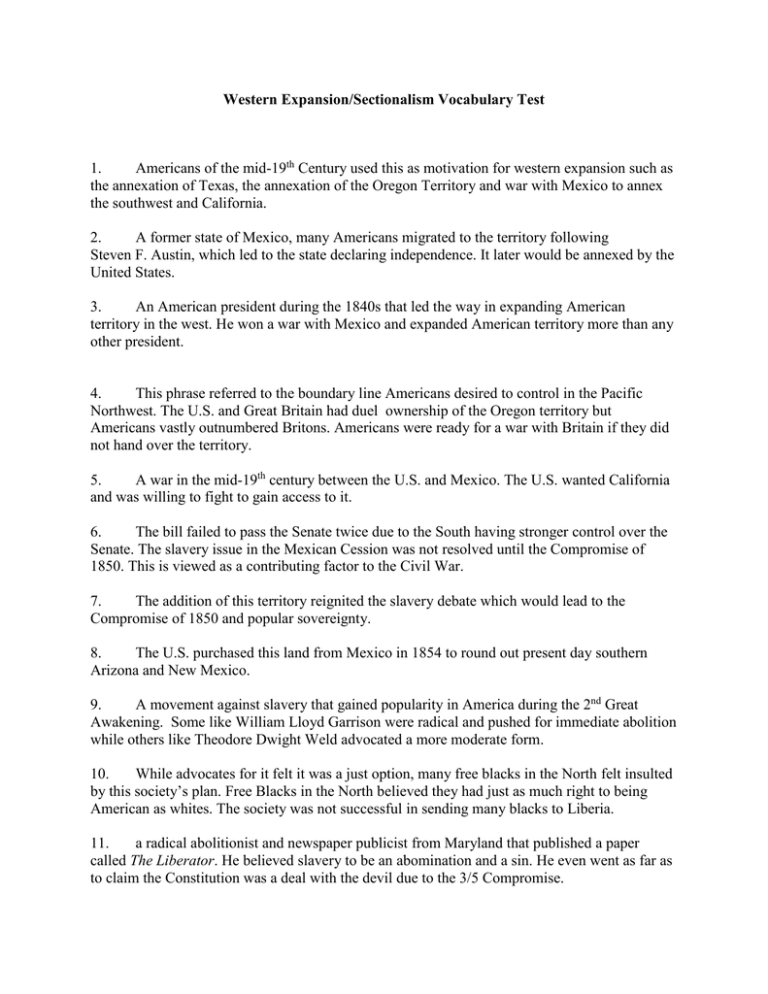
Western Expansion/Sectionalism Vocabulary Test 1. Americans of the mid-19th Century used this as motivation for western expansion such as the annexation of Texas, the annexation of the Oregon Territory and war with Mexico to annex the southwest and California. 2. A former state of Mexico, many Americans migrated to the territory following Steven F. Austin, which led to the state declaring independence. It later would be annexed by the United States. 3. An American president during the 1840s that led the way in expanding American territory in the west. He won a war with Mexico and expanded American territory more than any other president. 4. This phrase referred to the boundary line Americans desired to control in the Pacific Northwest. The U.S. and Great Britain had duel ownership of the Oregon territory but Americans vastly outnumbered Britons. Americans were ready for a war with Britain if they did not hand over the territory. 5. A war in the mid-19th century between the U.S. and Mexico. The U.S. wanted California and was willing to fight to gain access to it. 6. The bill failed to pass the Senate twice due to the South having stronger control over the Senate. The slavery issue in the Mexican Cession was not resolved until the Compromise of 1850. This is viewed as a contributing factor to the Civil War. 7. The addition of this territory reignited the slavery debate which would lead to the Compromise of 1850 and popular sovereignty. 8. The U.S. purchased this land from Mexico in 1854 to round out present day southern Arizona and New Mexico. 9. A movement against slavery that gained popularity in America during the 2nd Great Awakening. Some like William Lloyd Garrison were radical and pushed for immediate abolition while others like Theodore Dwight Weld advocated a more moderate form. 10. While advocates for it felt it was a just option, many free blacks in the North felt insulted by this society’s plan. Free Blacks in the North believed they had just as much right to being American as whites. The society was not successful in sending many blacks to Liberia. 11. a radical abolitionist and newspaper publicist from Maryland that published a paper called The Liberator. He believed slavery to be an abomination and a sin. He even went as far as to claim the Constitution was a deal with the devil due to the 3/5 Compromise. 12. A former slave and abolitionist that wrote a best-selling memoir of his time as a slave. He used tactics such as appealing to people’s integrity and religious beliefs. 13. This book sparked a firestorm of protest by pro-slavery advocates and praise by abolitionists. 14. This is the pro-slavery view that used biblical, pseudo-scientific, historical and racist views to justify the value of slavery in America. 15. It was passed to stifle the growing abolition movement in America. Southern and proslavery advocates felt the abolitionists were out to destroy their way of life and must be silenced. 16. While it solved the western slavery crisis for a time, it merely kicked the question down the road. It would later be voided by popular sovereignty passed as part of the Compromise of 1850 and the Kansas-Nebraska Act. 17. Following California’s petition for statehood Congress passed this compromise to appease both Pro and anti-slavery advocates. The law established California as a free state, allowed New Mexico the right of popular sovereignty to decide the issue of slavery, banned the slave trade in Washington D.C. and Created harsher fugitive slave laws. 18. Harsher terms were placed on fugitive slaves and those accused of assisting runaways. It was part of the Compromise of 1850 and was passed in part to offset the entrance of California as a free state. 19. This policy voided the earlier verdict of the Missouri Compromise which stated that no territory north of the 36-30 line would allow slavery and that all territory south of thee line would be a slave territory. A territory could now vote on whether to have slavery or not. 20. Created by Senators Stephen A. Douglas and Andrew Butler it called for the division of the Kansas-Nebraska Territory, and the right of people in the territory to choose popular sovereignty to decide whether to become a free state or a slave state. 21. A border war fought between free soilers “Jayhawks” and pro-slavery “Border Ruffians” over making Kansas a free or slave state. Following the Kansas-Nebraska Act and the call for popular sovereignty many people on both sides of the issue flocked to the territory to decide the fate of the new state. 22. A political movement that took shape following the Mexican War. Followers were only interested in keeping the new territory of the west free from slavery.. 23. A radical abolitionist that believed slavery could only be overthrown by violence. he was implemented in the murder of five pro-slavery settlers in Kansas Pottawatomie Creek. He also led an unsuccessful raid on Harper’s Ferry federal armory in Virginia in an attempt to free slaves in the south. 24. While the verdict was supposed to finally answer the slave question, it became a catalyst for the Civil War. Many northerners and abolitionists viewed this decision as a violation of states’ rights and proved their fears of a slave power conspiracy to control the United States. 25. The rise to power of this party demonstrated growing fears of foreigners in America and also the growing divide between pro and anti-slavery political factions. The parties collapse gave rise to the Republican Party.. 26. The establishment of this party led to an ideological split in American between pro and anti-slavery factions that would ultimately lead to the Civil War. 27. While Lincoln lost the bid for the Senate, it propelled him into the national spotlight for the Republican candidate for President in 1860. The debates also became the format for later political debates until the modern day. 28. Given by Stephen A. Douglas during the Lincoln-Douglas Debates in Which Lincoln pressed Douglas to take a side in the argument between popular sovereignty and the verdict of the Dred Scott case. Douglas chose to favor popular sovereignty, which pleased the Electors of Illinois to re-elect Douglas to the Senate in 1858. 29. A Senator from Massachusetts and leader of the anti-slavery wing of the Republican Party. He denounced the Kansas-Nebraska Act as a crime Against Kansas and vowed to uncover and denounce the slave power in America. Sumner attacked the authors of the Act, Stephen A. Douglas and Andrew Butler verbally for their part in writing the Act. 30. Southern Democrats vowed that if Abraham Lincoln won the election they would secede from the Union. The Democrats were split between North and South due to the slavery issue making a Republican victory easier. Answer Box a) Abolition Movement b) Election of 1860 e) Kansas-Nebraska Act f) Frederick Douglas h) Gag Rule i) Manifest Destiny l) Freeport Doctrine c) Charles Sumner g) Republican Party j) Dred Scott v. Sandford m) Bleeding Kansas d) Texas k) Free Soilers n) American Colonization Society o) Lincoln-Douglas Debates p) Popular Sovereignty r) Know Nothing/American Party u) Mexican Cession x) John Brown q) Wilmot Proviso s) Gadsden Purchase v) Apologist View of Slavery y) Fugitive Slave Act t) Uncle Tom’s Cabin w) 54-40” or Fight! z) William Lloyd Garrison aa) compromise of 1850 bb) James K. Polk dd) Gadsden Purchase ee) Mexican War cc) Missouri Compromise
